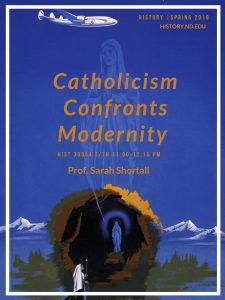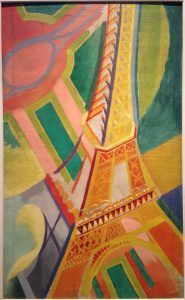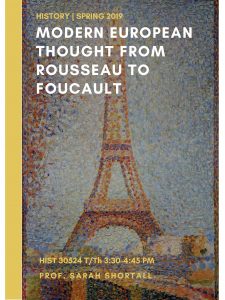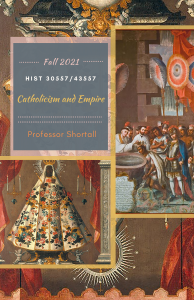UNDERGRADUATE
History 30554: Catholicism Confronts Modernity
 This class introduces students to the history of Catholicism since the French Revolution. It examines how Catholics confronted the challenges of modernity—from liberal democracy and nationalism; to capitalism and modern science; to new political ideologies such as fascism and communism. We will examine not only how these encounters transformed the Church, but also how Catholicism itself has shaped modern politics and culture. The first part of the course begins with the nineteenth-century “culture wars” between Catholics and anticlerical forces, focusing in particular on popular devotions like the Lourdes pilgrimage and the perceived “feminization” of religion. The second part of the course shifts to the twentieth century and examines the relationship between the Catholic Church and modern political ideologies such as nationalism, fascism, communism, and democracy. The third part of the course explores modern Catholic art, literature, and film. Finally, we close by examining the more recent history of Catholicism since the transformative changes of the Second Vatican Council in the 1960s. Readings are drawn from a range of primary sources—including novels, speeches, Church documents, works of art, and films—as well as secondary sources by historians.
This class introduces students to the history of Catholicism since the French Revolution. It examines how Catholics confronted the challenges of modernity—from liberal democracy and nationalism; to capitalism and modern science; to new political ideologies such as fascism and communism. We will examine not only how these encounters transformed the Church, but also how Catholicism itself has shaped modern politics and culture. The first part of the course begins with the nineteenth-century “culture wars” between Catholics and anticlerical forces, focusing in particular on popular devotions like the Lourdes pilgrimage and the perceived “feminization” of religion. The second part of the course shifts to the twentieth century and examines the relationship between the Catholic Church and modern political ideologies such as nationalism, fascism, communism, and democracy. The third part of the course explores modern Catholic art, literature, and film. Finally, we close by examining the more recent history of Catholicism since the transformative changes of the Second Vatican Council in the 1960s. Readings are drawn from a range of primary sources—including novels, speeches, Church documents, works of art, and films—as well as secondary sources by historians.
History 30454: Modern France since the Revolution
 The French Revolution, along with the American Revolution, is often considered the founding moment of modern democracy. And yet, democracy was not achieved once and for all in 1789. Over the course of the next two hundred years, France went through five republics, two empires, two monarchical dynasties, and one (arguably) fascist regime. In addition, it took hundreds of years for the egalitarian promises of the revolution to be extended to all members of French society. This course tells the story of this ongoing experiment in democratic governance—one that continues to this day. It introduces students to the major themes in the political and cultural history of modern France from 1789 to the present, examining how the universalist promise of the Republic has been contested and reshaped through its encounter with colonialism, industrialization, the rise of radical ideologies, religion, war, feminism, and multiculturalism. Course materials are drawn from a variety of sources, including novels, manifestoes, political cartoons, films, works of art and philosophy, as well as secondary works by historians.
The French Revolution, along with the American Revolution, is often considered the founding moment of modern democracy. And yet, democracy was not achieved once and for all in 1789. Over the course of the next two hundred years, France went through five republics, two empires, two monarchical dynasties, and one (arguably) fascist regime. In addition, it took hundreds of years for the egalitarian promises of the revolution to be extended to all members of French society. This course tells the story of this ongoing experiment in democratic governance—one that continues to this day. It introduces students to the major themes in the political and cultural history of modern France from 1789 to the present, examining how the universalist promise of the Republic has been contested and reshaped through its encounter with colonialism, industrialization, the rise of radical ideologies, religion, war, feminism, and multiculturalism. Course materials are drawn from a variety of sources, including novels, manifestoes, political cartoons, films, works of art and philosophy, as well as secondary works by historians.
History 30524: Modern European Thought from Rousseau to Foucault
 Since the eighteenth century, Europeans have grappled with a number of transformative events and developments, from the French Revolution and the birth of an industrial economy, to catastrophic wars and the rise and fall of European empires. In the process of making sense of these events, they produced works of philosophy, art, and literature that continue to shape the way we understand our place in the world today. This course introduces students to the history of European thought from the Enlightenment to the present, a period that birthed the many great “isms” that have defined the modern world: liberalism, socialism, nationalism, feminism, existentialism, totalitarianism, and colonialism. Course readings will be drawn from a range of primary sources, including novels, works of philosophy, political treatises, films, and works of art, as well as secondary sources by historians. By reading these two kinds of sources together, we will explore not only how ideas and works of art were shaped by the historical context in which they were produced, but also how they themselves shaped the course of European history.
Since the eighteenth century, Europeans have grappled with a number of transformative events and developments, from the French Revolution and the birth of an industrial economy, to catastrophic wars and the rise and fall of European empires. In the process of making sense of these events, they produced works of philosophy, art, and literature that continue to shape the way we understand our place in the world today. This course introduces students to the history of European thought from the Enlightenment to the present, a period that birthed the many great “isms” that have defined the modern world: liberalism, socialism, nationalism, feminism, existentialism, totalitarianism, and colonialism. Course readings will be drawn from a range of primary sources, including novels, works of philosophy, political treatises, films, and works of art, as well as secondary sources by historians. By reading these two kinds of sources together, we will explore not only how ideas and works of art were shaped by the historical context in which they were produced, but also how they themselves shaped the course of European history.
History 43557: Catholicism and Empire
 This course explores the historical relationship between the Catholic Church and the rise and fall of European overseas empires since the sixteenth century. We will consider how Catholic missionaries both reinforced and resisted colonial power structures; how the Church made sense of racial, religious, and cultural differences in its efforts to evangelize colonial subjects; how African, Asian, and Latin American Catholics developed their own distinctive spiritual practices; and how Catholics in both Europe and its former colonies grappled with the challenge of decolonization and how to undo the legacies of colonialism within the Church itself. Readings will be drawn from a range of sources, including missionary diaries and manuals, memoirs, artwork, papal encyclicals, films, novels, works of theology, and historical scholarship.
This course explores the historical relationship between the Catholic Church and the rise and fall of European overseas empires since the sixteenth century. We will consider how Catholic missionaries both reinforced and resisted colonial power structures; how the Church made sense of racial, religious, and cultural differences in its efforts to evangelize colonial subjects; how African, Asian, and Latin American Catholics developed their own distinctive spiritual practices; and how Catholics in both Europe and its former colonies grappled with the challenge of decolonization and how to undo the legacies of colonialism within the Church itself. Readings will be drawn from a range of sources, including missionary diaries and manuals, memoirs, artwork, papal encyclicals, films, novels, works of theology, and historical scholarship.
GRADUATE
History 93362: Perspectives on Religion and Politics
From the rise of ISIS to the recent legal wrangling over religious exemptions to the contraception mandate under Obamacare, it is clear that religion and politics remain deeply intertwined in the contemporary world. This has yielded a robust scholarly and theoretical literature exploring the past and present role of religion in public life. This course introduces graduate students to the key texts in this literature, which will be of use to those pursuing historical work on the relationship between religion and politics—particularly in the early-modern or modern era. Intentionally broad in scope, the course is designed to speak to graduate students with a variety of geographical, temporal, and confessional specializations. As such, it will focus less on substantive historical questions and more on the development of the conceptual tools needed to guide further historical study. We will read classic works of theory by philosophers and theologians, as well as more recent works by historians and scholars from cognate disciplines who have made key contributions to the field. Themes to be explored include secularization, political theology, totalitarianism, religious freedom and human rights, the role of gender and colonialism, and the relationship between religion and law. We will read works by Max Weber, Carl Schmitt, Ernst Kantorowicz, Eric Voegelin, Jürgen Habermas, Gustavo Gutiérrez, Saba Mahmood, Joan Scott, and Winnifred Fallers Sullivan, among many others.